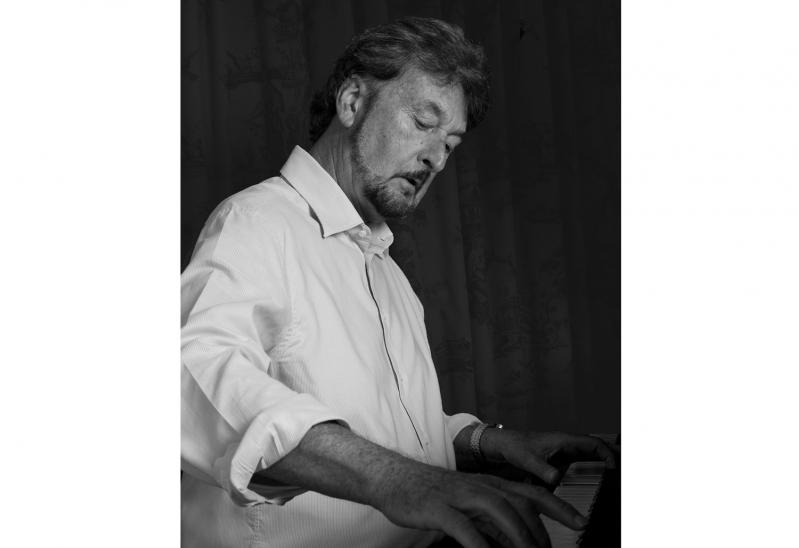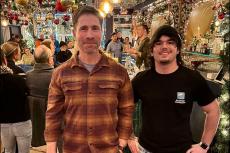Rick Davies, founder of the British rock-and-roll band Supertramp, which sold more than 60 million albums worldwide and produced hit songs including "Take the Long Way Home," "Bloody Well Right," "Dreamer," "Give a Little Bit," and "The Logical Song," died at home in East Hampton on Sept. 6. The cause was complications of multiple myeloma, with which he had been diagnosed in 2015. Mr. Davies was 81.
Supertramp, according to the critic and journalist Mark Deming, found international success by "fusing the stylistic ambition and instrumental dexterity of progressive rock with the wit and tuneful melodies of British pop, and the results made them one of the most popular British acts of the '70s and '80s, topping the charts and filling arenas around the world at a time when their style of music was supposed to have fallen out of fashion."
Mr. Davies's partnership with Roger Hodgson, who responded to an ad Mr. Davies placed in the British music magazine Melody Maker in 1969, was key to Supertramp's sound. According to The New York Times, Mr. Davies "tended toward an acerbic, world-weary tone, reminiscent of John Lennon" while Mr. Hodgson possessed a "Paul McCartney-esque ear for melody."
Mr. Davies and his wife, Sue Davies, bought a house in East Hampton in 1992, becoming year-round residents in the late 1990s. In his later years, Mr. Davies occasionally appeared at the Stephen Talkhouse in Amagansett, he and local musicians performing under the name Ricky and the Rockets.
"Supertramp songs were hits because they were great songs, performed and produced really well," said one of those local musicians, the guitarist G.E. Smith, who met Mr. Davies shortly after the latter's diagnosis. "The records still sound great. I knew all that Supertramp stuff because you heard it when it was a hit, but 'Bloody Well Right' — that's Rick. Everything in that song is Rick, that's how he was. He had that dry British sense of humor. He'd say something funny but he wouldn't smile. He'd love to tell a joke, or elaborate stories. Just a really nice guy."
Richard Davies was born on July 22, 1944, in Swindon, in southwest England, to Richard Campbell Howells Davies, who was born in Wales and was a bomb disposal expert in World War II, and the former Elizabeth White, who owned a hairdressing salon.
Like many of his peers who formed bands in the 1960s, Mr. Davies attended art school. In Bournemouth, England, he had a group with the Irish singer-songwriter Raymond O'Sullivan, who is known professionally as Gilbert O'Sullivan. "Gilbert was an usher at our wedding," Ms. Davies remembered.
Ms. Davies spoke of her future husband's band, the Joint, which had the backing of a Dutch millionaire named Stanley August Miesegaes. "They lived in Geneva, at his house," she said. "Sam," as he was called, "was a very wealthy guy with a plane and an Aston Martin. He fancied himself a manager." One day, she said, Mr. Davies awoke to find all of the band's equipment gone. Miesegaes had withdrawn his support for the Joint, but proposed that Mr. Davies start his own band. "It was the beginning of Supertramp," Ms. Davies said.
The Melody Maker ad, promising a "genuine opportunity" — "because he had Sam's backing and money," Ms. Davies said — brought Mr. Hodgson into the fold. The band's name came from another Davies, the Welsh poet W.H. Davies, author of "The Autobiography of a Super-Tramp."
The group's first two albums were not successful, but a move from progressive rock to a more melodic, pop sound, and a new lineup around Mr. Davies and Mr. Hodgson, brought Supertramp's breakthrough, "Crime of the Century," released in 1974 on the A&M label and featuring the hits "Bloody Well Right" and "Dreamer."
Ms. Davies, an Amityville native who visited the South Fork in summers, worked at A&M Records, first in the press department and later in artist development. "I was the person that picked them up from the airport the first time they came to the United States, took them to dinner, sent them off on junkets, helped set up their original tours," she said. " 'Crime of the Century' was the one we were working on when I met Rick and the whole band." The couple married on July 9, 1976.
Supertramp reached its commercial zenith with 1979's "Breakfast in America," which spent six weeks atop the Billboard 200 chart and included the top-20 hits "The Logical Song," "Take the Long Way Home," and "Goodbye Stranger." Following 1982's "Famous Last Words," Mr. Hodgson left the group.
Mr. Davies led a reconstituted Supertramp and issued albums over the ensuing decades. In 2015, "we had a completely sold-out arena tour of Europe" scheduled, said Ms. Davies, who was also Mr. Davies's manager. "I'm hearing the diagnosis, and the French promoter's on my other phone in the other ear: 'We're all sold out, I want to put up two more shows.' " The tour was canceled.
"There were a couple of local guys we've known," Ms. Davies said. "Brad Beyer, Mike Reilly [of Pure Prairie League], Bosco [Peter Michne]. Those guys started coming around, just meeting with Rick, and eventually brought in G.E." The concert promoter and impresario Ron Delsener was a neighbor. "He was bringing people in and out to get Rick's spirits up," Ms. Davies said. "G.E., Mike, and Rick were the nucleus, Brad was a constant. Different Supertramp guys came in when there was a show and were surprise guests. He loved that."
"I knew him in those 10 years he was ill," Mr. Smith said, "but he fought it. He was brave."
Mr. Davies was a jazz and blues fan. "He used to love to go to jazz clubs," Ms. Davies said, and the onetime art student continued to paint.
"Back in the day he played a lot of tennis," she said. Legends of the sport including John McEnroe and Ivan Lendl would attend Supertramp concerts, and Mr. and Ms. Davies would take in matches from the players' suites.
While a strong argument can be made for Supertramp's inclusion in the Rock and Roll Hall of Fame, Mr. Davies "wasn't big on accolades," his wife said. "He called the hall with his gold and platinum records the 'Hall of Shame' — a very dry sense of humor. He was very proud of what he did. He wanted a quiet life, he didn't want hoopla, and he hated interviews." His music spoke for him, she said.
Mr. Davies, who was an only child, leaves no other survivors. Per his wishes, there was no service. "His line," Ms. Davies said, "used to be 'Sue, when the day comes, just call Mickey's Carting and have them get me out of here.' "
She has suggested contributions to Weill Cornell Medical College, J. Michaeli Multiple Myeloma Fund, in memory of Rick Davies, and addressed to Weill Cornell Medicine Office of External Affairs, P.O. Box 22497, New York City 10087-2497.




